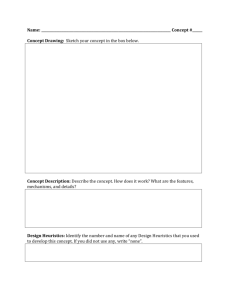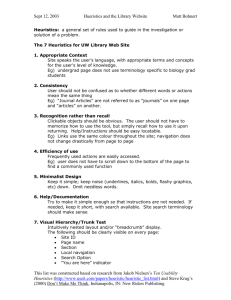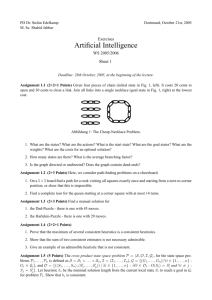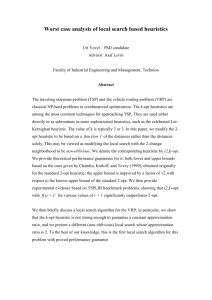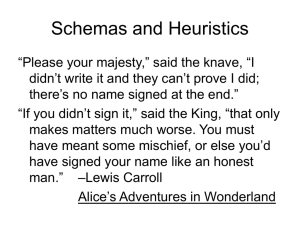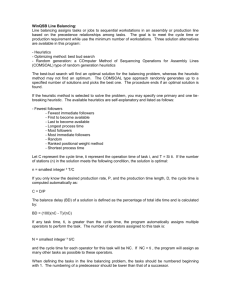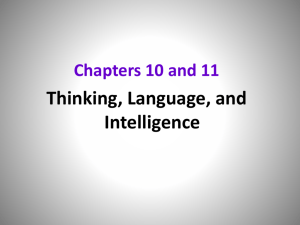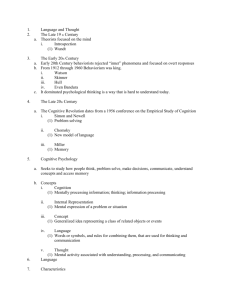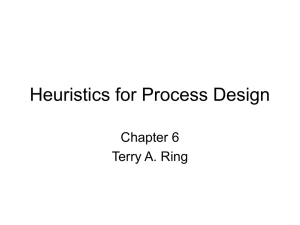Perception , Preconceptions, and - Arts
advertisement
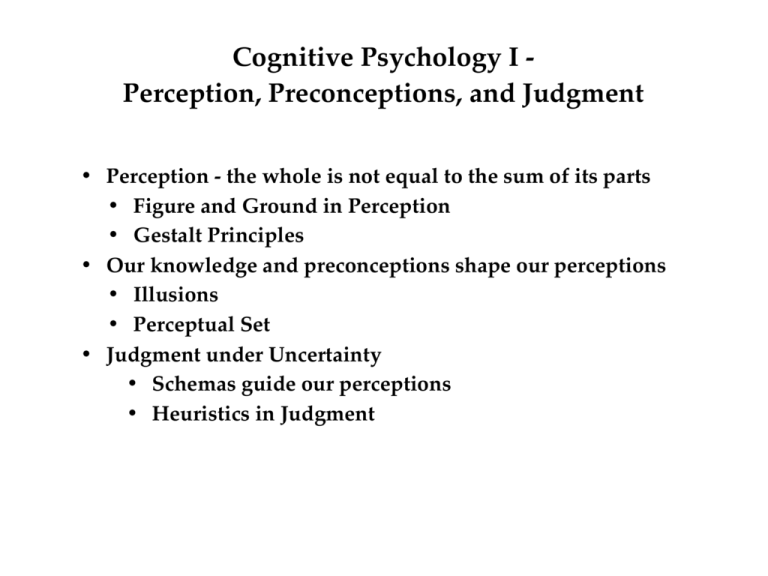
Cognitive Psychology I Perception, Preconceptions, and Judgment • Perception - the whole is not equal to the sum of its parts • Figure and Ground in Perception • Gestalt Principles • Our knowledge and preconceptions shape our perceptions • Illusions • Perceptual Set • Judgment under Uncertainty • Schemas guide our perceptions • Heuristics in Judgment Gestalt Psychologists • They noted that the whole is not equal to the sum of its parts. • By this they meant our thoughts and preconceptions shape what we perceive • The point is that we do not see exactly what is out there. Instead our perceptions are shaped by our thoughts. • Let’s look at some examples. The Whole is not Equal to the Sum of Its Parts The Whole is not Equal to the Sum of Its Parts II Figure and Ground in Perception Gestalt Grouping Principles Gestalt Principles of Closure and Good Form Our Knowledge and Preconceptions Shape Our Perceptions - Muller-Lyer Illusion Ponzo Illusion The Ames Room Perceptual Set - A Demonstration Schemas and Heuristics • We need schemas and heuristics to make sense of all the information that we process. • Too much information coming in through our senses to process each piece of information separately. • We also need schema and heuristics for effect communication. • Schema and heuristics allow us to go beyond the information given. Schema Allow Us to Go Beyond the Information Given The procedure is actually quite simple. First you arrange things into different groups. Of course, one pile may be sufficient, depending on how much there is to do. If you have to go somewhere else due to lack of facilities, that is the next step; otherwise you are pretty well set. It is important not to overdo things. That is, it is better to do too few things at once than too many. In the short run this may not seem important but complications can easily arise. A mistake can be expensive as well. At first the whole procedure will seem complicated. Soon, however, it will become just another facet of life. It is difficult to foresee any end to the necessity for this task in the immediate future, but then one can never tell. After the procedure is completed one arranges the materials into different groups again. Eventually they will be used once more and the whole cycle will then have to be repeated. Like Illusions, Heuristics Tell Us about how We Process Information • Representativeness Heuristic - an example More Heuristics • Availability Heuristic - an example More Heuristics • Representativeness Heuristic - an example • Availability Heuristic - an example • Anchoring and Adjustment - an example More Heuristics • • • • Representativeness Heuristic - an example Availability Heuristic - an example Anchoring and Adjustment - an example Risk and Loss Aversion - an example Focus on University of Waterloo Research Priming and Time Judgments (Dr. Jennifer Stolz) • For half of the participants each trial begins with a very brief prime (for example, bacon). • For the other participants there are no primes. • Next two different words come on the screen at almost the same time. One word is related to the prime (for example, eggs) the other word is unrelated to the prime (for example, water). • When people are not primed they are equally likely to judge that eggs and water appear first • When they are primed however they are more likely to think that eggs appeared before water. The Fragility of Memory • Memory Construction - The Construction of Automobile Destruction The Fragility of Memory • Memory Construction - The Construction of Automobile Destruction • We tend to remember what we want to remember • Can we forget what we want to forget? • It is not so easy • It is hard to suppress thoughts • “Recovered Memories” The Fragility of Memory • Memory Construction - The Construction of Automobile Destruction • We tend to remember what we want to remember • Can we forget what we want to forget? • It is not so easy • It is hard to suppress thoughts • “Recovered Memories” • Discerning True from False Memories
